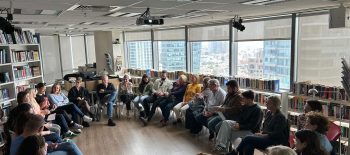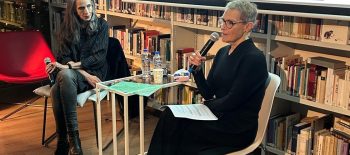Oren Nahari returns to Europe for a second season of the podcast series “Voices of Europe”
The series brings to readers of Haaretz from Israel and beyond insights, debates, and research-based discussions on different aspects of the European Union, its policies on a European and global scale, as well as issues of gender equality in science and research and the way forward for a cultural world hit by a global pandemic. Curated and hosted by Israeli leading journalist Oren Nahari, the nine-episodes series addresses the questions most relevant both to Europe and Israel.
In the second series, Oren Nahari continues exploring the EU’s political policies, the scientific leaps reached during 2020, the various impacts Covid-19 had on artists and creators and the brave new digital world facing us. The different guests, from Nobel Prize laureates to science fiction authors, allow the audience to approach Europe’s and the EU’s multifaceted character through a discursive approach.
“Voices of Europe” is an initiative of the European Union National Institutes for Culture [EUNIC], jointly produced by Haaretz Labels and EUNIC, including: Austrian Cultural Forum, Goethe-Institut, French Institute, Italian Institute of Culture, Lithuanian Culture Institute, The Romanian Cultural Institute in Tel Aviv, Spanish Embassy, the Delegation of the European Union to the State of Israel and the Polish Institute in Tel Aviv.
Both seasons of “Voices of Europe” are available on all popular podcast apps.
Episode Synopsis:
28.6
The data on women in science is well known – at the Nobel Prizes in Physics, Chemistry, Economics, the Turing Prize, women are less than five percent of the winners. What can be done to promote women in the fields of science and research?
Guests: Prof. Emmanuella Charpentier, Professor and researcher in microbiology, genetics and biochemistry from France
and Prof. Hagit Messer Yaron , a businesswoman and a professor of electrical engineering at Tel Aviv University
5.7
Imagination and Creativity in the New Digital Age (English)
Is art in the digital arena fundamentally different from art in any other arena? Does the tool – computer or the internet, change the essence of the work?
Guests: Dr. Kristupas Sabolius, a researcher and professor of philosophy at Vilnius University Lithuania
and Mr. Dan Michael Schlanger, President of the Bucharest Jewish Film Festival
12.7
In a world where Russia and China are increasingly aggressive, what tools does the EU have to navigate, and eliminate, the threats?
Guests: Mr. Iulian Fota, Associate Professor at the National Intelligence Academy and a former National Security Advisor to the President of Romania
and Dr. Tal Sadeh, Co-President of the Israeli Association for the Study of European Integration, and a senior lecturer at the Department of Political science of Tel Aviv University.
19.7
No longer just the “information age” – today we see cryptocurrencies – which are causing terrible environmental damage with insane power consumption, a digital art world where works are already selling for millions and tens of millions of dollars – what’s next?
Guests: Prof. Aharon Hauptman, engineer, researcher and lecturer in the fields of technological and social forecasting and future research, the translator of “Solaris” by Stanislaw Lem,
and one of the founders of the Israeli Association for MDA and Fantasy,
and Dr. Keren Landsman, an Israeli epidemiologist and science-fiction writer. She won the Geffen Award four times.
26.7
Populism and Political Ideology (English)
Eighty years ago there were less than ten democracies in the world, perhaps democracy is not as natural to us as we think? Why is populism rising around the world?
Guest: Prof. Oliver Marchart, Professor for Political Theory at the Wien University
and Prof. Dani Filc,the department of Politics and Government, the Faculty of Humanities and Social Sciences at the Ben Gurion University of the Negev
The Victory of Science (English)
the amazing scientific achievements of the year, and the question of resistance to vaccines, conspiracy theories and more
Guests: Prof. Telmo Pievani, the Department of Biology, University of Padua, Italy
and Prof. Menachem Rubinstein, the Department of Molecular Genetics at the Weizmann Institute of Science
9.8
Did we reach the point of no return in regard to the oceans, is the Mediterranean dying? And how do you control something like air that is uncontrollable, and can travel from one country to the next?
Guests: Prof. Michael Scoullos , environmental Chemist and Oceanographer. Professor of Environmental Chemistry at the University of Athens,
Director of the Laboratory of Environmental Chemistry.
and Mr. Jaime Montalvo, International Director Spanish Chamber of Commerce
16.8
The Future of Tourism (English) ֻ
Many countries and cities like the Vatican, Venice, Barcelona etc. have complained a lot about excess tourism. What will tourism look like the day after the virus?
Guests: Prof. Dr. Wolfgang Strasdas from Germany, a specialist of environmental planning, tourism in developing countries and environmental protection
and Mrs. Mónica Gómez Royuela from the Climate Change Office, Spain
23.8
Arts and Culture During and After Covid-19 (English) | 13.7 / 4:30PM
Guests: Mariette Rissenbeek, Executive Director of the Berlin International Film Festival
and Kristina Savickienė, a theater company leader from Lithuania



